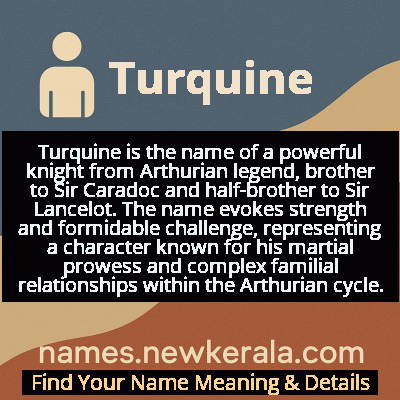Turquine Name Meaning & Details
Origin, Popularity, Numerology Analysis & Name Meaning of Turquine
Discover the origin, meaning, and cultural significance of the name TURQUINE. Delve into its historical roots and explore the lasting impact it has had on communities and traditions.
Name
Turquine
Gender
Male
Origin
Arthurian
Lucky Number
8
Meaning of the Name - Turquine
Turquine is the name of a powerful knight from Arthurian legend, brother to Sir Caradoc and half-brother to Sir Lancelot. The name evokes strength and formidable challenge, representing a character known for his martial prowess and complex familial relationships within the Arthurian cycle.
Turquine - Complete Numerology Analysis
Your Numerology Number
Based on Pythagorean Numerology System
Ruling Planet
Saturn
Positive Nature
Ambitious, efficient, realistic, and authoritative.
Negative Traits
Materialistic, stressed, confrontational, and can be overly ambitious.
Lucky Colours
Dark blue, black.
Lucky Days
Saturday.
Lucky Stones
Blue sapphire, amethyst.
Harmony Numbers
2, 4, 6.
Best Suited Professions
Business leaders, managers, financial services, law enforcement.
What People Like About You
Leadership, determination, organizational skills.
Famous People Named Turquine
Sir Turquine
Arthurian Knight
Infamous knight who captured and imprisoned 64 knights, defeated by Sir Lancelot
Turquine of the Tales
Literary Character
Appears in Thomas Malory's Le Morte d'Arthur as a formidable antagonist
Turquine the Strong
Legendary Warrior
Known for his immense physical strength and holding knights captive in his castle
Name Variations & International Equivalents
Click on blue names to explore their detailed meanings. Gray names with will be available soon.
Cultural & Historical Significance
Turquine's story reflects the medieval fascination with chivalric codes and the tension between personal vengeance and knightly duty. His eventual defeat by Lancelot not only establishes Lancelot's supremacy but also serves as a commentary on the destructive nature of unchecked ambition and revenge. The character has been interpreted as representing the 'shadow' aspect of knighthood - possessing all the physical attributes of an ideal knight but lacking the moral compass that defines true chivalry. His legacy continues to influence modern interpretations of Arthurian antagonists in literature and media.
Extended Personality Analysis
Individuals named Turquine are typically characterized by formidable determination and intense loyalty to their causes. They possess a strong sense of purpose and are often driven by deep-seated principles or personal missions, much like their Arthurian namesake who was motivated by vengeance for his brother's death. These individuals tend to be physically robust and mentally resilient, capable of enduring significant challenges while maintaining their resolve. Their strength of character is often matched by a certain intensity that can be both intimidating and inspiring to others.
However, this single-minded determination can sometimes manifest as stubbornness or an unwillingness to compromise. Like the legendary knight, modern Turquines may struggle with balancing their personal goals with broader ethical considerations. They are often natural leaders who command respect through their competence and conviction rather than through charisma alone. While they can be formidable opponents when crossed, they typically operate within a strict personal code of honor and are capable of great loyalty to those who earn their trust. Their complex nature makes them both challenging and rewarding companions.
Modern Usage & Popularity
The name Turquine remains exceptionally rare in modern times, primarily appearing in academic discussions of Arthurian literature or among enthusiasts of medieval history. It has never ranked in official baby name registries and is considered a 'literary name' rather than a practical given name. Contemporary usage is largely confined to fictional characters in Arthurian retellings, historical reenactment communities, and as a distinctive choice for pets or online personas within fantasy gaming communities. The name's strong association with a specific character from Arthurian legend limits its appeal for modern parents, though it occasionally surfaces in creative writing circles or among those seeking uniquely historical names with rich narrative backgrounds.
Symbolic & Spiritual Meanings
Symbolically, Turquine represents the concept of formidable opposition and the shadow aspects of knighthood. The name evokes images of strength tested, honor challenged, and the complex interplay between familial loyalty and personal ambition. In metaphorical terms, Turquine symbolizes the obstacles that heroes must overcome to prove their worth, serving as a representation of the trials that define character and establish legacy. The name carries connotations of physical prowess tempered by moral complexity, suggesting that true strength involves not just martial ability but ethical discernment. It stands as a reminder that even antagonists in great stories often operate from understandable motivations, making them mirrors through which protagonists can better understand themselves.

